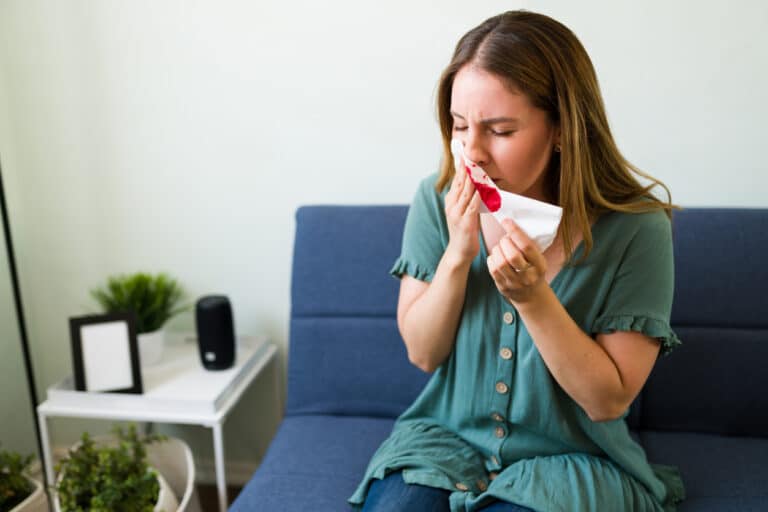Getting a nosebleed, especially if you’re not used to them, can feel a little alarming. While nighttime nosebleeds can be bothersome, mild bleeding is not usually a cause for concern. Let’s look at why noses bleed, a couple of common reasons for nighttime nosebleeds, how to prevent them and when to seek treatment.
Why Are Noses Prone To Bleeding?

Nosebleeds, also called epistaxis, occur when you lose blood from the tissue that lines the inside of your nose. Nosebleeds are very common, with approximately 60% of people experiencing at least one nosebleed in their lifetime. Dry air and tiny blood vessels in the lining of the nose make the area more prone to bleeding.
What Are Some Common Causes of Nighttime Nosebleeds?
A few common causes of nighttime nosebleeds include:
- Dry air. Dry air in the home can lead to cracking inside the nose. While South Carolina is known for its humidity, there may be cases where the air in your home is too dry. If this is the case, try using a humidifier while you sleep at night or taking a long, hot shower without running the bathroom fan.
- Allergies. Frequent sneezing from allergies can irritate the lining of the nose and lead to bleeding, especially if your symptoms worsen at night. Additionally, nasal antihistamines and corticosteroids used to manage allergy symptoms can dry the nose. If your allergy medications are causing nosebleeds, contact an allergy specialist for alternative treatments.
- Frequent nose blowing. Blowing your nose too often or forcefully, especially when your nose is dry, can irritate the nasal cavity and lead to bleeding. If your nose is congested, try running a saline solution through your nostrils to clear mucus. If congestion persists, reach out to your ENT specialist for treatment options.
How Can You Stop a Nosebleed?
To stop a minor nosebleed at home, follow these steps:
- Sit upright and lean your torso and head slightly forward. Leaning forward will help keep blood from running down your throat.
- Breathe slowly through your mouth and use a tissue or washcloth to catch blood.
- Pinch the soft part of your nose against but not above or on the bony ridge. Keep pinching for another five to 10 minutes.
- Once the bleeding stops, avoid bending over, straining or lifting heavy objects. Don’t blow or aggressively rub your nose for a few days.
Seek emergency care if nosebleeds follow an injury, last longer than 30 minutes, produce a large amount of blood, cause trouble breathing or occur in children two years or younger.
If you experience frequent or severe nosebleeds, contact Palmetto ENT & Allergy to consult one of our specialists for diagnosis and treatment.
